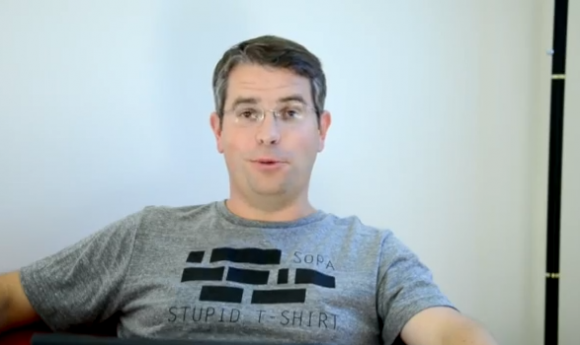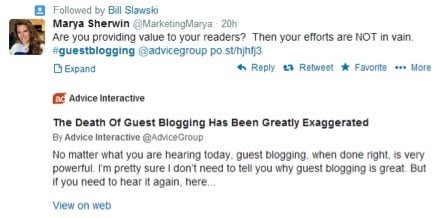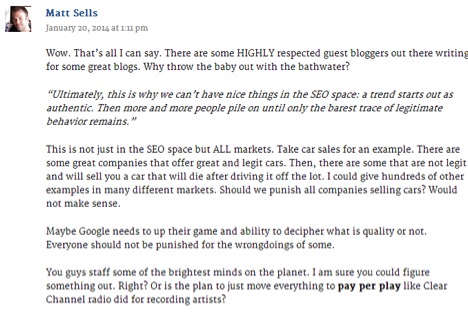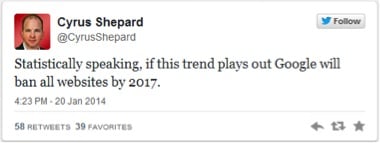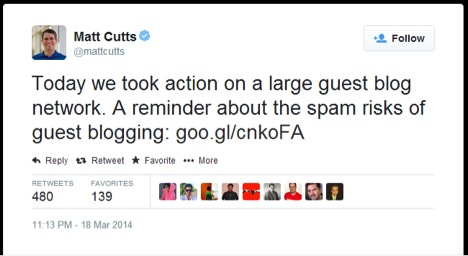The Butterfly Effect of Matt Cutts’ Comments on Guest Blogging
We may be well into the 2nd quarter of the year, but January 20, 2014 is a day which will live in infamy. This was the day that Google’s SEO and webspam aficionado, Matt Cutts dropped some comments that rocked the guest blogosphere. Fires were set, cannons roared, and chaos reigned. Digital marketers ran headlong out of their corner office windows in order to avoid the disparaging fallout to follow…
Luckily, they were on the first floor, but never mind that.
The point is the entire industry shifted, and further developments have only gotten juicier. Whereas it was once fairly simple to avoid being penalized or dropped from Google indexes, now there are a new set of standards to abide by within an entire genre of link building. Let’s begin our examination with a sobering view of what Google’s go-to SEO guru actually had to say on the subject of guest blogging.
High Quality Writing vs. Spam
On his personal blog, Mr. Cutts released the incendiary post ominously entitled: The Decay and Fall of Guest Blogging. And this guest blogger nearly crapped his pants thinking he might have to get a—terrified gasp—real job.
It didn’t look good from the get go:
“Okay, I’m calling it: if you’re using guest blogging as a way to gain links in 2014, you should probably stop. Why? Because over time it’s become a more and more spammy practice, and if you’re doing a lot of guest blogging then you’re hanging out with really bad company.”
I cannot deny. I was indeed born with a six shooter in my hands, and will, in fact, be bad company until the day I die.
Party’s over man. Nobody will hire me to spread the word about their products, services, or websites ever again. My words are subsidiary to that oh so spammy backlink that I tried to hide within the text. Damn my eyes!
Yet all was not quite lost, he did add a bit of somewhat contrary context to his initial comments:
“I’m not trying to throw the baby out with the bath water. There are still many good reasons to do some guest blogging (exposure, branding, increased reach, community, etc.). Those reasons existed way before Google and they’ll continue into the future. And there are absolutely some fantastic, high-quality guest bloggers out there.”
Say what now?
So guest blogging is “dead,” and you’ve stuck “a fork in it,” but there are also still a bunch of “good reasons” to do it?
Initial Reactions
While that’s confusing, it’s also encouraging. There is a clear distinction between quality articles and useless text used to hide spam links.
Maybe all is not quite as lost as first impressions caused me to conjecture. I, after all, do pride myself on being a fantastic writer with many a potent poetic metaphor in my artistic arsenal. Surely my particular brand of literary literacy will still be appreciated and sought after in the days following this so-called death and decay of guest blogging.
Even so, mine is hardly the only response. There were other reactions: some confident, others cocky, and many downright confused. This confusion was quickly followed by fear, and the near simultaneous rage of the digital collective.
Observe:
To be fair, there were plenty of folks who agreed with Matt’s summation of the guest blogging dilemma. But that’s boring, and not the least bit funny. So I’ll return now to my over-inflated rhetoric, already in progress. J
The great Google had spoken, and the marketing community cringed, cried out, and curled their lips in defiant snarls at the terrible injustice of it all. Cutts’ comments went off like a bomb causing shockwaves in the SEO universe far and wide.
The seeming ambiguity surrounding the rumors of penalties drew the ire of prevalent industry personalities such as Keven Phelps, Jerod Morris, and Ann Smarty in particular. File that name away for use in the immediate future.
The thing to turn your focus on right now is the mudslinging that took place in preparation for an impending witch hunt.
Accusations of FUD tactics (an abbreviation for Fear, Uncertainty, and Doubt) were a prevailing sentiment. Many guest blogging advocates admonished Cutts and Google for putting out a propaganda piece designed as a PR stunt to frighten websites away from anything that could be construed as spammy. This would eliminate opportunities both for guest bloggers and sites looking to link build legitimately through the practice of creating quality content.
Such speculative accusations were widespread, and revealed to be grounded, at least partly, in truth shortly thereafter.
The MyBlogGuest Penalty
Translation: cry havoc and let slip the dogs of war. Lines have been drawn and the massacre has begun. There will be many casualties in this campaign to end spam. The first is a major guest blogging network run by none other than the aforementioned Ann Smarty.
Ann created MyBlogGuest in 2009, and built it into an industry leader by connecting guest bloggers to sites requesting content, as well as clients looking to get their links onto authoritative blogs. MyBlogGuest was targeted by Google specifically because of their policy on “do follow links.”
Because MyBlogGuest requires any links contributed from their platform to be do follow. In other words, their clients were not allowed to prevent search bots from recognizing and taking their links into account when determining search rankings.
For that fallacy, they have been soundly smote to the ground.
Google, and Cutts have both been very specific in their policies against “do follow” links, and if you intend to have your content ranked in Google, and avoid a penalty yourself, it’s in your best interest to add rel=’nofollow to any link contained in a guest blog on your website.
This seems to be the crux of the issue. As you can imagine, reactions varied from the incensed to the assenting. A community rallied, people complained, and Google succeeded in its overall mission to scorch the earth of spammy guest bloggers, unaware and/or uncaring of the serious bloggers caught in the wake of their destruction.
Cautious Optimism
As far as SEO and link building are concerned, guest blogging is 6 feet under 5 times over. If, however, we’re talking about brand awareness, thought leadership, and quality content… Well, then guest blogging is still in the springtime of youth, laughing in fields and picking daisies, as opposed to pushing them up.
The big takeaway here is to keep your blogs free of do follow links, lest you risk the wrath of the penalizing powerhouse that is the world’s leading search engine. For all my fellow writers out there, do what you’re best at doing. String pretty sentences together and thank your lucky stars that you work in such an awesome industry. Google thinned a revenue stream for us, but they didn’t poison the well.
The industry certainly rippled, fluctuated, and quaked beneath the footfalls of the Google giant, but guest blogging isn’t going anywhere. People still read, and the pen is yet mightier than the sword. So greet tomorrow with cautious optimism. We’ll live to write another day.
Are you still dissatisfied? Worried you’ll flounder without your do follow links bolstering your SEO scores? Leave a comment for me to consider for my future ramblings.
This post was written by Zack Rutherford, a freelance copywriter. He contributes web content and especially snappy articles to TemplateMonster. Combat sports enthusiast and poetic soul, Zack endeavors to create beauty through syntax, sentence structure, and the liberal use of hyperbole. Follow him on Twitter (@zack_rutherford) or visit his website (Zackrex.com) to read all of his innermost thoughts and unfounded opinions.

